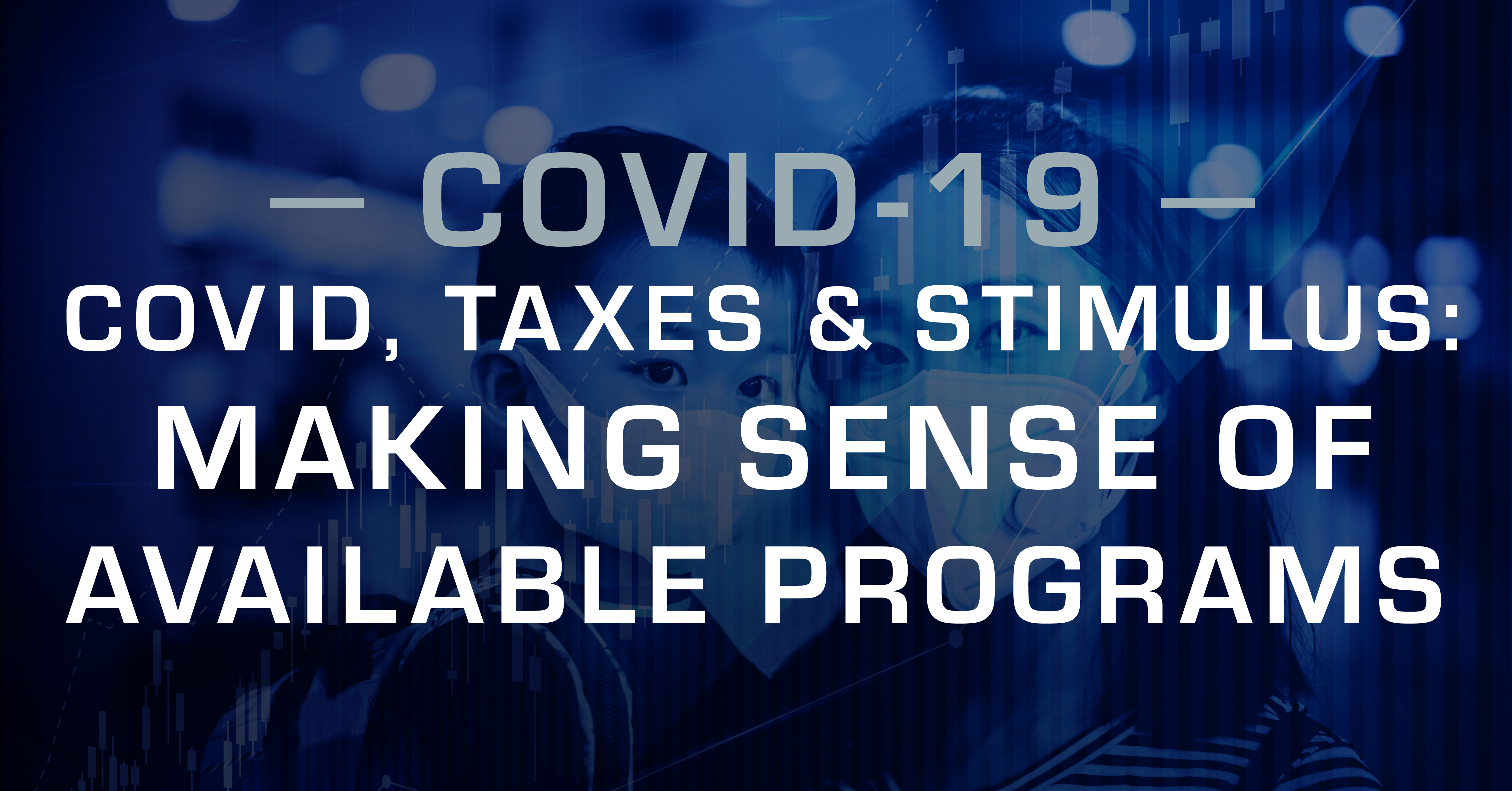
There has been so much thrown at taxpayers in the last few weeks regarding new legislation and rule making that apply to businesses, employees and taxpayers. In an effort to provide some context and help you understand what programs apply to you, we wanted to provide a COVID-19 Policy Update. Below we have summarized some of the key programs, dates, deadlines, etc. which you may find important. If you have any questions regarding these programs, please don’t hesitate to contact our offices to discuss what options are available.
Paycheck Protection Program – Update
At this time, the Small Business Administration has stopped accepting applications for the Paycheck Protection Program loans because the processed loan volume has reached the $349 billion level currently authorized by the CARES Act.
It is our understanding that Congress and the White House have come to terms on an expansion of the PPP loan opportunities, but we still await finalized legislation. We recommend contacting your banker to find out if they are still accepting applications. Many banks will continue to accept applications in case additional funds become available under this program.
Economic Injury Disaster Loan (EIDL)
Recently President Trump formally declared – for the first time in history – that all 50 states are officially in a federally designated disaster. The Small Business Administration’s (SBA) disaster loans are the primary form of Federal assistance for the repair and rebuilding of non-farm, private sector disaster losses. The disaster loan program is the only form of SBA assistance not limited to small businesses.
The Economic Injury Disaster Loan Program (EIDL) can provide up to $2 million of financial assistance (actual loan amounts are based on amount of economic injury) to small businesses or private, non-profit organizations that suffer substantial economic injury as a result of the declared disaster, regardless of whether the applicant sustained physical damage.
An EIDL can help you meet necessary financial obligations that your business or private, non-profit organization could have met had the disaster not occurred. It provides relief from economic injury caused directly by the disaster and permits you to maintain a reasonable working capital position during the period affected by the disaster. EIDLs do not replace lost sales or revenue.
To be eligible for EIDL assistance, small businesses or private non-profit organizations must have sustained economic injury and be located in a disaster declared county or contiguous county (a requirement now met throughout the United States). Additionally, please note that there is some question on eligibility for the PPP program if you have applied for, or have received, an EIDL loan. You should discuss those options with your banker.
This application can be completed online here: https://covid19relief.sba.gov/#/
Economic Injury Payments
These payments, also referred to by some as stimulus payments, are automatic for most taxpayers. No further action is needed by taxpayers who filed tax returns in 2018 and 2019 and most seniors and retirees.
If you have questions about your eligibility for this program or want to obtain the status of your payment click https://www.irs.gov/coronavirus/economic-impact-payments
IRS and Iowa Tax Due Date Changes
The IRS and state of Iowa have extended due dates for filing 2019 tax returns and paying any tax that would have been due in April.
Federal 2019 tax due AND 2020 tax estimates that are normally due on April 15 AND June 15 are now due on July 15. Iowa 2019 tax due AND 2020 tax estimates that are normally due on April 30 are now due on July 31.
The Federal 2020 estimated tax payment schedule is:
- 1st Estimate is due on July 15, 2020
- 2nd Estimate is due on July 15, 2020
- 3rd Estimate is due on September 15, 2020
- 4th Estimate is due on January 15, 2020
The Iowa 2020 estimated tax payment schedule is:
- 1st Estimate is due July 31, 2020
- 2nd Estimate is due July 31, 2020
- 3rd Estimate is due September 30, 2020
- 4th Estimate is due January 31, 2021
IRA and HSA Contribution Due Dates
As a result of the extension to file tax returns by July 15, the IRS has also extended the due date to make Individual Retirement Account AND Health Savings Account contributions for the 2019 tax year to July 15, 2020.
Beware of Scams
Some of the most common tax scams are phone calls and emails from thieves pretending to be from the IRS.
Here are several tips to help you avoid being scammed. IRS employees will not:
- Call demanding an immediate payment.
- Call you without first sending a bill in the mail.
- Demand you pay your taxes in a specific way.
- Ask for credit or debit card numbers over the phone.
- Threaten to have you arrested.
- Threaten legal action.
If you receive an inquiry like this, report the incident using the “IRS Impersonation Scam Reporting” page. https://www.treasury.gov/tigta/contact_report_scam.shtml

